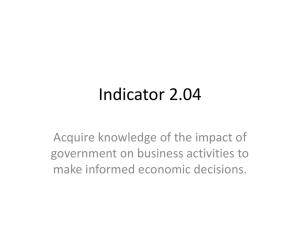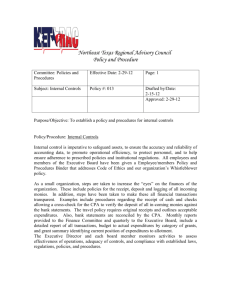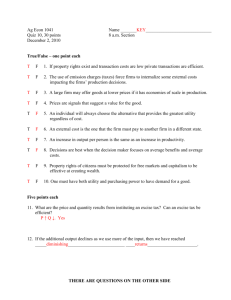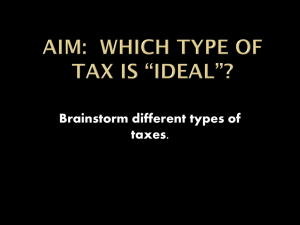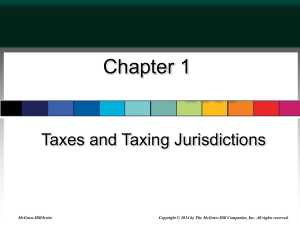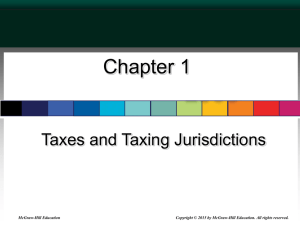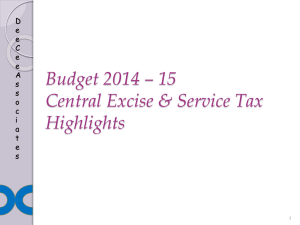Describe the nature of taxes
advertisement
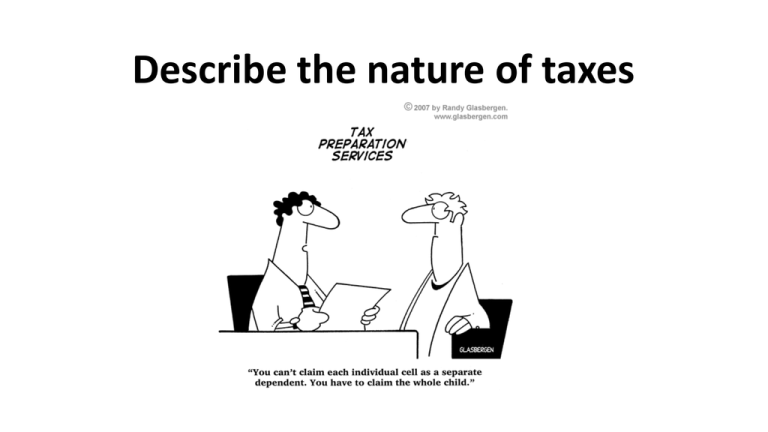
Describe the nature of taxes What are taxes • Legally mandated payment to the government that is not made in exchange for a good or service • Examples: income tax, sales tax, property tax, excise tax • Taxes are used to fund projects that benefit society. Income Tax • Tax that Is based on the amount of money a person earns or receives Sale Tax • Tax placed on the retail sale of almost all goods purchased • Certain types of goods (i.e., food, medicine) are sometimes excluded from sales tax. Excise tax • Tax placed on a specific good • Excise taxes can be used to discourage consumption of a product or to raise some easy money on products that the government knows people will continue to purchase, regardless of the tax. • Example: gasoline tax, cigarette tax, beer and liquor tax Property Tax • Tax placed on real estate, and in some cases, on personal possessions (e.g., boats, vehicles, etc.) Importance of taxes in a market economy. • Taxes are the primary source of revenue for the government sector. • In a market economy, some services such as national defense, roads, and education can be more efficiently produced by the government instead of private individuals. • In addition, the government is responsible for creating the infrastructure necessary for commerce. The banking system, national defense, and the transportation system are all part of this infrastructure. • If taxes did not exist, then these services would likely not exist either. Sources of tax monies paid • Federal Government: Sources of Tax Monies: Income taxes, Excise taxes o Expenditures: National defense, Education, Transportation systems, Judicial system, Social Security and Medicare, Medicaid, Veterans services, etc. Sources of tax monies paid • State Governments: • Sources of Tax Monies: Income taxes, Sales taxes, Excise taxes • Expenditures: State police protection, Education, Operation of state government, etc. Sources of tax monies paid • Local Tax Sources of Tax Monies: Property taxes, Sales taxes, Income taxes • Expenditures: Education, Public health and safety (local fire and police protection), Sanitation, etc. Discuss the duties of the Internal Revenue Service. • To collect federal income taxes • To enforce federal revenue law • To help taxpayers with tax law • To pursue taxpayers who are not in compliance with tax law Tax Structures • Proportional: A tax structure in which everyone pays the same percentage of income in taxes, regardless of income level. (Few taxes are completely proportional in nature.) • Progressive: A tax structure in which those who earn more pay a higher percentage of income in taxes. In other words, as the income increases, the tax rate increases. The Federal income tax is a progressive tax. • Regressive: A tax structure in which those who earn more income pay a lower percentage of income in taxes. As income increases, the tax rate decreases. Sales and excise taxes are considered to be regressive taxes, because those people with lower incomes ultimately pay a larger percentage of their income in sales and excise taxes. Performance Activity • Search local newspapers to locate articles in which individuals or groups are opposed to an increase in taxation. In a 1 page summary, identify the nature of the tax, how the monies are to be used, and the nature of the opposition to the tax. Indicate your position on the tax increase, providing a rationale for your stance. • The Great Tax Debate – Which tax structure do you believe to be the best for the United States. Research the topic to support your view. Write a half page summary supporting your view.
